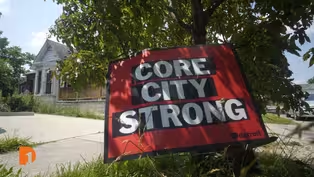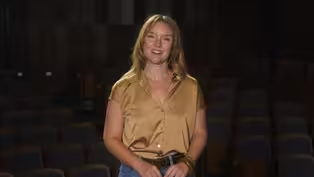
Detroit native shares story of how the 1967 uprising impacted him
Clip: Season 10 Episode 6 | 2m 21sVideo has Closed Captions
Native Detroiter Robert Davis participates in One Detroit’s “Destination Detroit” series.
Native Detroiter Robert Davis reflects on his parents' journey to Detroit in the 1950s, his childhood in the city and how the 1967 uprising in Detroit affected his neighborhood and one of his childhood friendships. His story is part of Detroit PBS' “Destination Detroit,” a series that explores the region's rich history and the people who shaped it.
Problems playing video? | Closed Captioning Feedback
Problems playing video? | Closed Captioning Feedback
One Detroit is a local public television program presented by Detroit PBS

Detroit native shares story of how the 1967 uprising impacted him
Clip: Season 10 Episode 6 | 2m 21sVideo has Closed Captions
Native Detroiter Robert Davis reflects on his parents' journey to Detroit in the 1950s, his childhood in the city and how the 1967 uprising in Detroit affected his neighborhood and one of his childhood friendships. His story is part of Detroit PBS' “Destination Detroit,” a series that explores the region's rich history and the people who shaped it.
Problems playing video? | Closed Captioning Feedback
How to Watch One Detroit
One Detroit is available to stream on pbs.org and the free PBS App, available on iPhone, Apple TV, Android TV, Android smartphones, Amazon Fire TV, Amazon Fire Tablet, Roku, Samsung Smart TV, and Vizio.
Providing Support for PBS.org
Learn Moreabout PBS online sponsorship(gentle music) So actually, my mother and my father came to Detroit from two different places in the '50.
My father lived in Huntsville, Alabama, and came to Detroit to work for Ford.
Actually, he responded to the call.
He started out in Highland Park, and then he moved to the Rouge plant eventually, so he worked there for his entire career.
My mother came from Fairfax, Virginia to Detroit to go to Wayne State, she wanted to study medicine.
Ended up having six kids, and the rest is history.
Ford was opportunity, just as you look at this beautiful place today.
So, he and his brother came up to Detroit.
He landed at Ford, his brother landed at Chrysler.
Detroit in the '50s and the '60s, when you really think about it, was an expansive period of time, particularly for African-Americans.
And so, both parents, as they connected, their life just really just rose very quickly to the middle class.
They brought a house not too far from this train station.
As the family grew, we moved to, what we considered a very robust middle-income community, LaSalle and Linwood.
And there, we started out.
I recall back in 1967, I guess it was, when the riots broke out.
We went to church on 12th Street.
We got a call that morning saying, don't come to church because 12th Street was on fire.
So, that was an important sort of benchmark in the history, my history.
I remember one of my best friends, his name was Michael.
He was a little white guy, I was, you know, African-American.
And we used to play, we didn't know about race, we didn't know about any of that, how our differences were.
And then one day, he just disappeared.
And I didn't understand why, but he moved out of the city.
His family quickly rushed out after 1967, and left us in Detroit.
And it was really fear on both parts.
But we, as 8-year-old kids, I mean, it didn't matter what your skin color was.
(gentle music continues)
How one Detroit neighborhood stopped heavy industry in its midst
Video has Closed Captions
Clip: S10 Ep6 | 20m 44s | Residents mobilized against a proposed concrete crushing operation. (20m 44s)
Things to do around Detroit this weekend: August 8, 2025
Clip: S10 Ep6 | 1m 54s | A sailing festival, music festival and other fun events happening around Metro Detroit this weekend. (1m 54s)
Providing Support for PBS.org
Learn Moreabout PBS online sponsorship
- News and Public Affairs

Top journalists deliver compelling original analysis of the hour's headlines.

- News and Public Affairs

FRONTLINE is investigative journalism that questions, explains and changes our world.












Support for PBS provided by:
One Detroit is a local public television program presented by Detroit PBS

